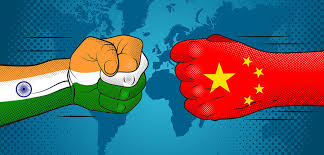India’s long-standing regional presence has often led its neighbours to seek counterweights.
In South Asia, geopolitical allegiances are constantly evolving, shaped by economics, strategic interests, and historical ties. Over the past few decades, China’s influence has steadily expanded across India’s neighbouring countries, often outpacing New Delhi’s diplomatic and economic outreach. The question that arises is: why do most of India’s neighbours appear to lean pro-China? The answer lies in a combination of economic dependence, strategic alignments, and diplomatic manoeuvring.
One of the primary reasons behind China’s appeal to India’s neighbours is its vast economic clout. The Belt and Road Initiative (BRI), launched by Beijing in 2013, has resulted in massive infrastructure development in countries like Pakistan, Nepal, Sri Lanka, and Bangladesh. These nations have received billions in loans for highways, ports, and railways—investments they may struggle to obtain elsewhere. Despite concerns about debt diplomacy, many leaders view China’s financial aid as a shortcut to modernization.
India’s long-standing regional presence has often led its neighbours to seek counterweights. For Pakistan, China provides military support, economic aid, and diplomatic backing against India. In Sri Lanka, Beijing has cultivated ties by funding projects such as the Hambantota port, increasing its sway over Colombo’s foreign policy. Nepal and Bangladesh have also increasingly engaged with China to diversify their economic partnerships, reducing dependence on India.
While India maintains deep historical and cultural ties across South Asia, its interactions with neighbouring states sometimes involve domestic political concerns. For example, India’s involvement in Nepal’s constitutional debates and Sri Lanka’s Tamil issue have, at times, created friction. China, on the other hand, presents itself as an ally with a “non-interference” approach—offering economic aid without political conditions. This has made Beijing an attractive partner for governments seeking external investment without domestic scrutiny.
India faces the challenge of countering China’s deep entrenchment while strengthening its own regional ties. Initiatives like the Neighbourhood First policy and connectivity projects aim to reinforce India’s influence, but they will need sustained momentum. Prioritizing infrastructure, trade agreements, and cooperative diplomacy will be key to ensuring New Delhi remains an influential force in its backyard.
In the unfolding contest for regional dominance, China has effectively positioned itself as South Asia’s benefactor. Whether India can alter the balance will depend on its ability to match Beijing’s economic agility and diplomatic finesse.
* Nephew of the Dalai Lama, Khedroob Thondup is a geopolitical analyst.







